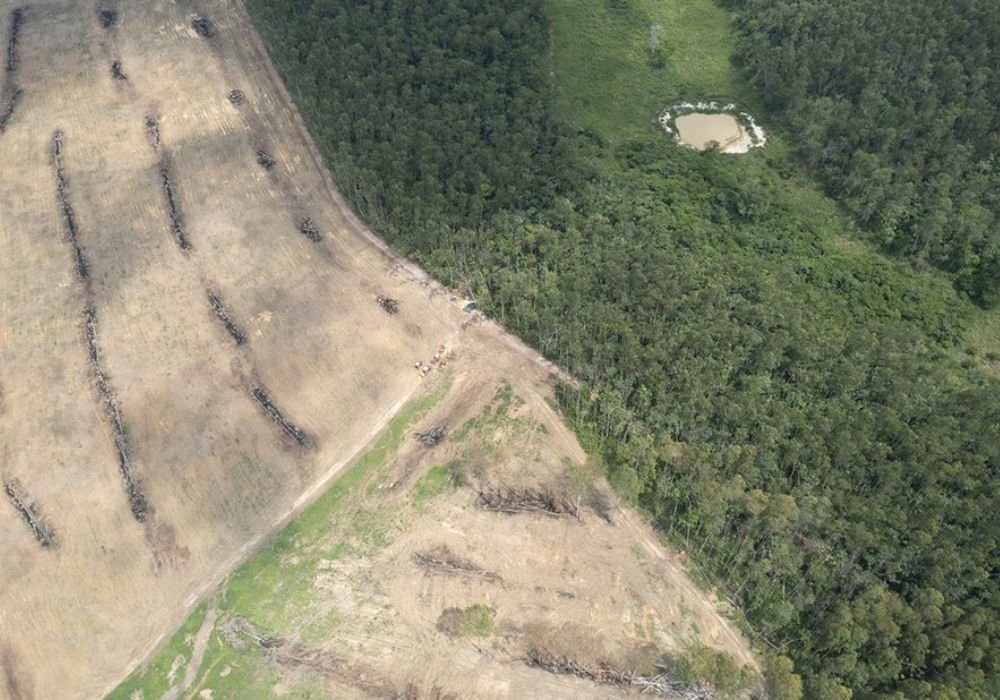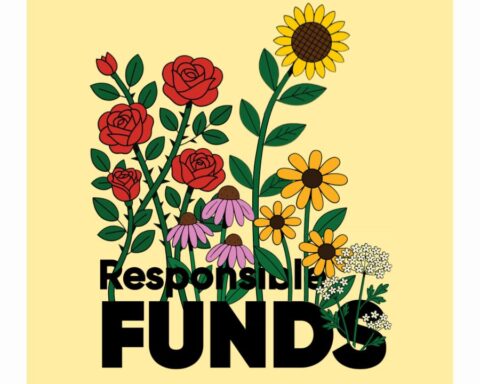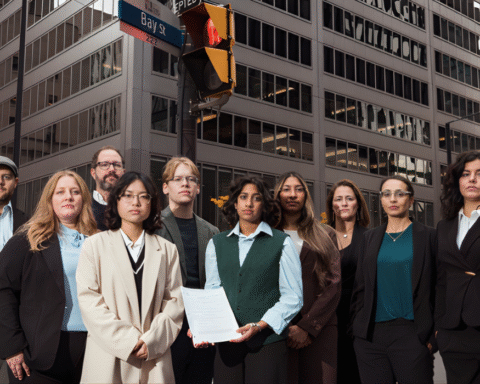Funds marketed as environmentally friendly are being used by major asset managers to funnel millions of dollars to the world’s largest meatpacker, JBS, a company notorious for its links to deforestation and human rights abuses via its supply chain.
Research by Global Witness found that US asset managers BlackRock and Vanguard are among six firms holding over $11 million in active bonds issued by JBS and its subsidiaries via funds with “environmental, social and governance” (ESG) in their name.
While most of the funds’ documentation analysed explicitly cite exclusions relating to fossil fuels and controversial weapons, none outright exclude companies linked to deforestation in their screening process.
This is despite forest loss contributing to up to 20% of global greenhouse gas emissions, with agricultural clearance driving more than 90% of global tropical forest loss.
More than half of financial institutions with the largest exposure to deforestation, including BlackRock, Vanguard and State Street, are yet to publish a single policy on deforestation, according to Forest 500’s 2024 annual report. This suggests overall levels of engagement from the financial sector with forest-risk companies are minimal.
“Simply incorporating the ‘ESG brand’ in fund names is often far too vague, failing to exclude climate-destructive companies like JBS,” said Global Witness’s US Senior Policy Advisor, Ashley Thomson.
“One of the clear issues with relying on self-reporting, self-managed ESG funds is the lack of standardisation on what exactly ESG means.”
Analysis by Global Witness of Eikon Refinitiv data obtained in June 2024 shows that 15 ESG-labelled funds held $11.6m in 16 JBS bonds.
“The fact that a company like JBS is included in an ESG-focused fund should speak volumes about the limitations of regulations governing these funds, and the dangers of allowing companies to grade their own homework,” Thomson added.
One of the clear issues with relying on self-reporting, self-managed ESG funds is the lack of standardisation on what exactly ESG means.
– Ashley Thomson, Global Witness’s US Senior Policy Advisor
Similar concerns have also been raised by Tariq Fancy, BlackRock’s former sustainable investment chief, who criticised the firm for “misleading investors” by using the ESG label, calling it a “dangerous placebo”. He argued that BlackRock’s CEO Larry Fink made hollow promises about ESG, which were quickly abandoned when it was becoming politically controversial.
JBS is widely regarded as an ESG pariah. From 2021 to May this year, 22 investors, including banks and pension funds, have divested from JBS or its subsidiaries, citing its links to biodiversity loss and governance issues, according to the Financial Exclusion Tracker project.
Earlier this year, Global Witness published a report linking JBS, along with other meatpackers Marfrig and Minerva, to more than 80,000 football fields of deforestation in Brazil.
In addition to well-documented environmental and social concerns, JBS has faced governance issues in the past, with the executive of its parent exposed for their involvement in a widespread corruption scandal in Brazil in 2017. The executives also pleaded guilty to US foreign bribery charges in 2020 as part of a plea deal.
The company said in a statement to Global Witness that it has “an open and transparent relationship with its investors and bondholders” who are fully aware of its “zero-tolerance policy for illegal deforestation in all Brazilian biomes, or any other illegal activity” associated with its supply chains.
Mounting concerns over JBS’s governance and its links to environmental destruction are reinforced by the state of New York’s lawsuit against the company’s US branch for allegedly “misleading” clients over its climate pledges.
Earlier this year, the state’s Attorney General, Letitia James, accused the company of having “no viable plan” in place for meeting its public commitment to reach net zero by 2040.
RELATED:
- We’re razing forests for palm oil plantations again
- Some light in a dark climate year: Amazon deforestation is down 56%
- Tree planting in the face of Canada’s worst wildfire season
The lawsuit came less than a year after JBS announced a plan to restart its decade-long attempt to list its shares on the New York Stock Exchange via a dual listing under a new Dutch parent company “JBS N.V.”. JBS hopes its dual listing, likely delayed to the second half of 2024, will increase its access to US capital.
Global Witness and several other climate organisations have warned about the risks of the dual listing and the proposed corporate restructuring that comes with it – which would grant the Batista family 84.85% of voting power, up from their current 48.4% entitlement.
This would limit opportunities for shareholders other than the Batista family to exert influence over the company, including its impact on the environment and populations affected by its supply chain.
Financial giants
With unmatched economic influence, BlackRock and Vanguard have also been two of the top private investors in companies tied to deforestation in the past decade, with a combined $4.5 billion in assets under management in forest-risk companies, according to Forests and Finance data.
Investor appetite for ESG investing has exploded in recent years, with total assets under management reaching $30 trillion in 2022, or a quarter of the global investible assets, according to Bloomberg Intelligence (BI).
Market share of ESG assets is expected to remain steady at a quarter of the global market, which is expected to reach $140 trillion by 2030, according to BI’s projections.
The favourable forecast for the ESG market comes despite the blow it suffered in 2023, considered by financial services provider Morningstar as the worst year to-date for the asset class.
In addition to middling returns and an increasingly hostile political landscape in the US, with Republicans pushing back against ESG investment, Morningstar attributed the limited growth to investors’ concerns about greenwashing, given the absence of “clear, cross-border” ESG regulation.
Unclear rules
A third of the funds analysed by Global Witness were domiciled in the US, where ESG fund labelling is a source of debate.
In September 2023, as part of its attempt to combat greenwashing, the US Securities and Exchange Commission (SEC) adopted amendments to its “names rule”, which now requires 80% of a fund’s portfolio to match the objective cited in its name.
Separately, the SEC is under pressure to finalise a second rule, which strengthens disclosure requirements about the makeup and purpose for ESG funds. Investors would have to label them according to one of three distinct categories: ESG-integrated funds, ESG-focused funds and impact-focused funds.
Hortense Bioy, head of sustainable investment research at Morningstar, notes that a broader issue in the US is that climate regulations are currently being challenged by “those that think it’s not enough, and those that think it’s too much,” making the regulatory environment “very uncertain.”
In the EU, the European Securities and Markets Authority (ESMA) recently published new guidelines that require funds with “ESG” or other sustainability-related search terms in their names to ensure that at least 80% of their assets meet the sustainable investment objective of the fund, according to their Sustainable Finance Disclosure Regulation (SFDR) status.
The SFDR, effective since 2021, requires sustainable funds to be categorised as either Article 6 (no ESG mandate), Article 8 (promoting ESG characteristics), or Article 9 (explicit sustainable investment objective). But three years in, there is “still no answer” as to what really constitutes a sustainable investment in the EU, says Morningstar’s Bioy.
While an estimated 60% of funds in the EU are now labelled as Article 8 or 9 under SFDR, Hortense says, there’s acceptance among financial institutions that “[not everything in them] can be green.”
Bioy’s assessment is backed by an investigation published last month by VoxEurope and The Guardian that revealed EU-regulated “sustainable” funds held $18 billion in 200 companies considered the biggest polluters across the eight most-carbon intensive sectors in the final quarter of 2023, including fossil fuels and fast fashion.
In the US, Bryan MgGannon of the US Sustainable Invesment Forum (USSIF) says SEC rules have generated some positive impact, but adds that unlike the EU, which has an investment taxonomy that explicitly identifies green sectors, there is “no consensus” in the US on driving capital towards “greener options.”
Instead, he says, US legislation focuses on providing transparency to let investors decide on their own investments.
Divesting from JBS
Asset managers including BlackRock’s own CEO Larry Fink have routinely made the case that engaging with companies to influence their practices is more effective than divestment, which merely shifts ownership to potentially less responsible investors.
Several investors, however, including UK and Netherlands-based firm Cardano Group – which only offers Article 8 or 9 funds – opted to divest from JBS in 2020 following failed engagement efforts.
Cardano Group first began engaging with JBS via a “collaborative initiative on deforestation,” says Greta Fearman, Cardano Group’s head of stewardship and sustainable investment. Over the years, her firm identified additional ESG risks, such as “corruption-related” controversies, and “even worker issues,” which JBS failed to rectify in their opinion.
Fearman noted: “We understand deforestation is complex, and it doesn’t get solved overnight … But what [JBS] provided in terms of their oversight and expectations of suppliers was not robust enough.”
The findings that so many ESG funds are investing in JBS highlight a critical need for new regulation in key financial centres like the EU, UK and US, so that institutional investors screen out businesses driving biodiversity loss through deforestation from their portfolios and ESG funds specifically, says Global Witness’s Ashley Thomson.
We need a regulatory system that prioritises the sustainability of our planet, not just short-term earnings. We have this order flipped right now, and that’s a very scary reality to be living in.
Global Witness contacted all the financial institutions mentioned.
Polly Bindman is a forests investigator with Global Witness and Elisângela Mendonça is a senior investigator with Global Witness. Additional reporting from Charlie Hammans.
This article was originally published by Global Witness.
ESG Funds identified
BGF ESG Fixed Income Global Opportunities A2 EUR
FlexShares ESG & Climate High Yield Corporate Core
iShares ESG Aware USD Corporate Bond ETF
iShares ESG Global Bond Index Fund
iShares ESG Screened Global Corporate Bond Index Fund (IE)
JPM USD Corpo Bd Research Enhcd Idx ESG UCITS ETF
State Street Global High Yield Bond ESG Screened Index Fund
The NT Global High Yield ESG Bond Index Fund
Trust Management-ESG International Bond
Vanguard ESG Global Corporate Bond Index Fund
Vanguard ESG Global Corporate Bond UCITS ETF
Vanguard ESG US Corporate Bond ETF
Vanguard ESG USD Corporate Bond UCITS ETF
VictoryShares ESG Core Plus Bond ETF
VictoryShares ESG Corporate Bond ETF
Source: Refinitiv Eikon, accessed in June/2024







